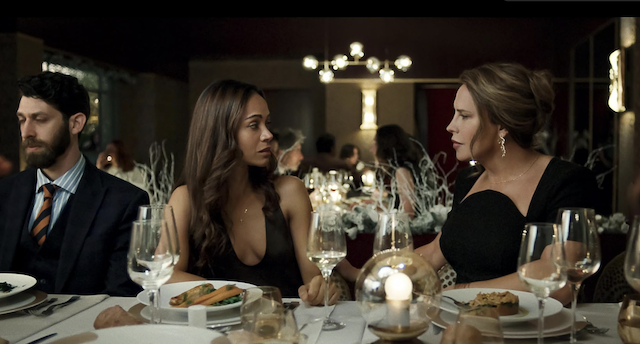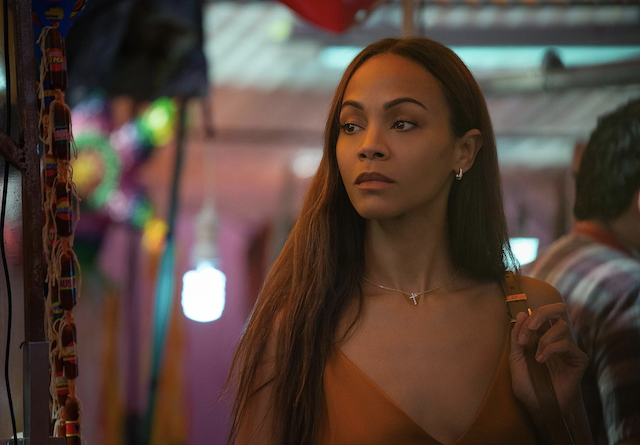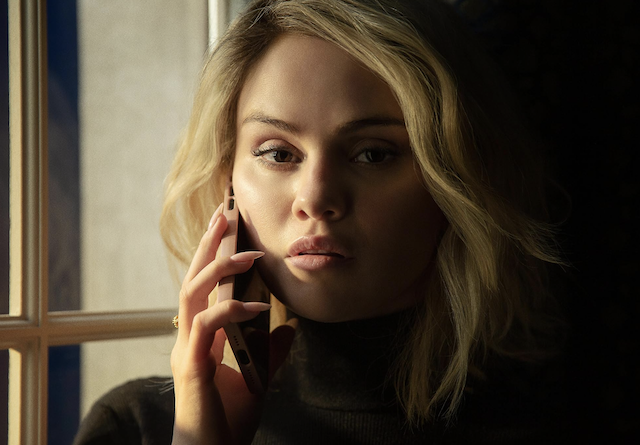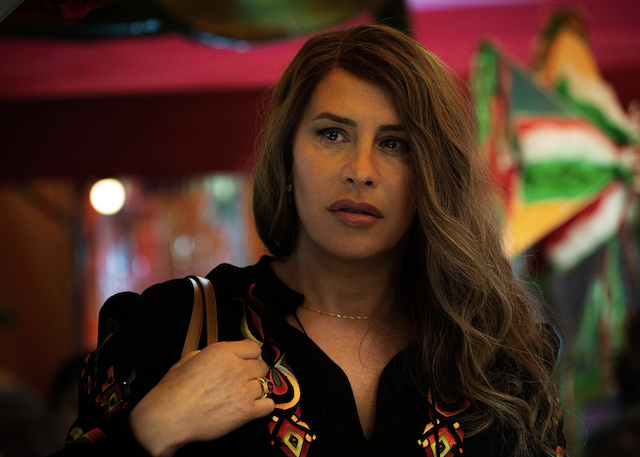

©Courtesy of Netflix
Q&A with Director Jacques Audiard
Q : Getting up here with Jacques and talking about it is Torture. (Lol) But it’s also incredibly exciting because I think it is one of the most pulsating pieces of cinema I’ve seen in many many years. Congratulations.Where did you start, as writer/director myself, how long ago did you read this passage and had this idea?
Jacques Audiard: Four or five years, it takes me a long time…
Q : Four or five years for that film? You read this passage, you have this idea for this character. And then, from what I understand, we’ve talked a little bit about this, you had this idea for opera.
Jacques Audiard : The strange thing is when I first wrote the text let’s take a step back. I first read the novel and there was a chapter, and in that chapter there was a character who was a drug kingpin who asked a male lawyer who wasn’t a female lawyer from MIT to help him transition.
And the author of the book does not develop this character at all. The very day after I gave him a call and I said, do you have any plans to work on this? he said, no. I said, okay, I’ll do it. The very first time I wrote a treatment that was only 30 pages long,
There were no scenes as such, there were just set pieces, and the characters were very archetypal, there was no psychological development, so I’m not sure why I chose to write it in that form.
Q: Okay it transitions from opera to screenplay. What was the biggest driving factor? Why did you say, obviously you’re an amazing filmmaker. So was it just that I make films, so it must be a film?
Jacques Audiard: I started working with my musicians, we worked on it for quite some time. And at a certain point I found myself asking Clément, but what is this that we’re writing? Is it a scene for an opera or is it a movie?
And he told me right away, it’s obviously a movie. And I told him, why didn’t you tell me sooner ? I think if it had been an opera, we would’ve needed at least two more hours of music .
Q : All right I have to say one thing I love about this movie is how seamlessly it transitions in the song. And I think musicals are so difficult to capture successfully on screen. This somehow subverts that. And it’s right from the opening, right out of the opening credits, that sonic landscape of the movie.
The way you’re coming down over the city and you’re hearing the refrigerators, stoves, sets up this overture, you think, Oh, I’m in for something different. It continues and takes us into the first song at some point. Was this a concern of yours as a filmmaker, of how to transition from really verite, into real heightened music? It’s an incredible accomplishment that it’s so seamless. How big of a fear was it of yours going in, or will I bridge this?
Jacques Audiard: You’re right. The way you describe it is accurate. I needed to ask myself what role the songs and the score play? With my musicians, we talked for a long time because it took me a while to understand. At the beginning, I thought we needed a unified style for all the songs, but that was a mistake. Finally, I realized we needed a sharp contrast between the score and what the songs did. And in return, the songs needed to clarify certain points and the score was there to unify. And so that’s why you have this sort of lethargical style to the score and such. So there were two layers: the songs with a function and the score with the unifying concept.

©Courtesy of Netflix
Q : You were working with your writers composing songs. We talked about this the night we were over, and I talked a little bit about Thomas (Bidegain=Screenwriter) too, but it sounded like you were working with the songwriters and musicians, writing the screenplays simultaneously.
How did that trade back and forth? Were you giving them pages as you went? They couldn’t have been writing in a vacuum, right? What was that collaboration like? And how ongoing was that? Between you, Jacques, as screenwriter, and them as songwriters.
Jacques Audiard : Thomas and I would write in the morning, then give our pages to the musicians in the afternoon. What was challenging for me was figuring out what would be enough material for a song. Even the script, I knew that a certain part of it was empirical, day after day, to decide what would make it into it.
And we all worked very fast, so they gave us the opportunity to really adjust what they were doing, little by little, as we were working. So we would cook it like that, day after day, together. When I talk about this to an audience like this audience, which is made of industry people, who are very familiar with musicals in America, and they have an idea of what a musical would be like as a model what we did was completely different. It was a radically different approach we all learned together as we went along.
Q: Yeah, it’s amazing. I will say it’s rare that you sit in a theater like we did tonight and see something that continually surprises us but feels organic to the story. I think that is one of the great feats of this movie. I never felt thrown from the movie, and considering how many genres are within this movie, that’s exceptional. And I think that is tied together, for me, by tone. The tone you strike through all the changes, remains consistent. From melodrama to humor, thriller to musical, and everything in between. When you’re working with your actors how did you talk about this movie early on? How did you speak with them? Did you let your screenplay do the talking.
Jacques Audiard: I was very lucky with my actresses, My actresses were formidable, so open to experimenting, I brought them all over in the musical, so much can happen, dance pieces, different things I felt free to change on the fly, even on set, because they were solid enough to accept all of that.
I shot it all in the studio in Paris, because when I did a scout on location in Mexico, I realized that the reality would take me down. I needed a much greater degree of stylization because there still is that operatic DNA. And I’m not sure why I was saying this, and what took.
Q : She’s literally translating everything. Jock’s vulnerability is translated. We should salute these incredible actresses. you’ve pushed them to places I’ve never seen before ferocious and courageous performances. I just saw no, no fear. Just, I’m gonna go wherever the fuck this character needs to go. And it’s just, it felt unleashed. Congratulations on that. Is this the first time you’ve worked with cinematographer?
Jacques Audiard: No, it’s the second time.
Q : yeah. And the film is stunning. Where do you start on a movie that’s this very, like, where do you start on, when you’re in conversation with DP, do you start at the beginning and go scene by scene, or do you plot a bigger picture at the beginning?
Jacques Audiard : Even though I have a hard time describing it, I had a clear form for the movie in mind. The first day of shooting is very important. What we shot first was the Amigato scene, the very first one, the opening scene of the movie. And when you create a scene like that with a character that walks forward and then all of a sudden she’s surrounded by a whole bunch of people.
It’s a very black and thin scene. And so if the viewer accepts that and takes it on, then the same viewer will accept everything else that comes forward. So it’s a great degree of stylization.

©Courtesy of Netflix
Q : Yeah, that first scene is riveting and has so many colors. There’s a sense of danger, propulsion, vulnerability, and then how that segues into the court scene is beautiful. You’re French, but you do this film in Spanish, in Mexico. What made you decide to do that and how did you absorb the culture to get it so authentic and genuine?
Jacques Audiard : That’s very nice of you to say. I didn’t want to make a movie that would be folkloristic, when the movie starts even before the video and credit roll, you see some mariachis. And so I put them right in the start. So that could be over and done with you. See them, you know where you are. It was a Mexican movie and people speak Mexican Spanish, but it is very operatic and highly stylized. I don’t even speak Spanish at all. Regret that.
Q : There Are certain scenes in this movie that are so intimate. So intimate and just small and gentle. Did you ever worry about the distance from these broader moments to this? Were you always confident, Jacques? And that’s just because you’ve made so many incredible movies at this point that you thought, I can bridge that.
Or was it something as a filmmaker you had to see to start feeling? Do you know what I mean? Did you have to start filming it because I know from talking with you a little bit and with Thomas on how you work, that you have a way of shooting extra film, extra scenes. so I’m wondering how much you did that to connect the pieces.
Jacques Audiard : No, in this movie I couldn’t do that because of all the singing and dancing. That required a lot more preparation. Because normally, as you said, I do have this habit of working, writing quick scenes that are extra when I have my sets and actors. I just write a page or two and slip it to the actors and they have fun shooting that.
Then I put them in my final editing and changed the order. But in this particular movie, because of the way, of how complex it was, I couldn’t pull that off. So here, I worked on it for so long with all components that I wasn’t really used to. Like the music, or the choreography that dimension did. The way the characters change the film changes in terms of the genre. I quickly realized that I wanted my movie to transition between genres as well.
Q : That’s incredible. I have one more and then we’re going to go.It’s getting late, but you watch this film and it’s incredible to think most of this movie was shot on a soundstage. They created all these rooms and you feel so transported it never feels small. It always keeps expanding.
Jacques Audiard : It was a discovery for me. It’s the first time I shoot a movie entirely in a studio. I took great pleasure in doing that.
If you like the Q&A, share your thoughts below!
Check out more of Nobuhiro’s articles.
Here’s the trailer of the film.

